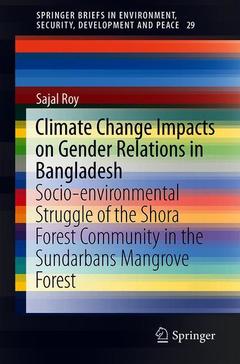L’édition demandée n’est plus disponible, nous vous proposons la dernière édition.
Climate Change Impacts on Gender Relations in Bangladesh, 1st ed. 2019 Socio-environmental Struggle of the Shora Forest Community in the Sundarbans Mangrove Forest SpringerBriefs in Environment, Security, Development and Peace Series, Vol. 29
Auteur : Roy Sajal

This book explores gendered perceptions of the Sundarbans Forest in Bangladesh, and the extent to which these perceptions are affected by extreme weather events (specifically, cyclones Aila and Sidr). Based on ethnographic fieldwork in Shora, a rural village in southern Satkhira, Bangladesh, the book explores gendered activities in the forest, especially women?s interaction with the forest resources. The findings present a clear picture of the Shora community?s local knowledge about the Sundarbans Forest, as well as the ecological and economic contributions for the forest people. The book makes a timely contribution to the wider study of gender, post-cyclone recovery, ecology and resilience.
Chapter 1. Introduction: Sundarbans Forest and the Gendered Context of Cyclones Aila and Sidr.- Chapter 2. Theoretical Approaches: Gendered Knowledge in Forest, Ecology and Environment.- Chapter 3. Methods and Methodology.- Chapter 4. Narratives of the Sundarbans Forest at Shora.- Chapter 5. Women’s perceptions of and behaviours toward the Sundarbans forest.- Chapter 6. Survival at Shora: Ecological Security and the Sundarbans Forest.- Chapter 7. Implications of the gendered knowledge about the Sundarbans Forest at Shora and beyond.
Presents the first ethnographic data interpreting the essentials of Sundarbans Forest ecology
Presents survivor narratives of cyclone Aila and Sidr through the lens of historical connectedness to the Sundarbans Forest
Explores gendered distribution of forest resources
Generates timely discussion on gender and environment, ecofeminism, the Sundarbans Forest, ecological security and climate change
Date de parution : 05-2019
Ouvrage de 101 p.
15.5x23.5 cm
Disponible chez l'éditeur (délai d'approvisionnement : 15 jours).
Prix indicatif 52,74 €
Ajouter au panierThèmes de Climate Change Impacts on Gender Relations in Bangladesh :
Mots-clés :
Historical connectedness with Sundarbans Forest; Sundarbans Mangrove Forest; Shora Forest Community of Bangladesh; Cyclones Aila and Sidr; Gender Relations; Gendered Knowledge in Forest; Ecology and Environment; Local ecology; Women’s indigenous knowledge; Forestry management; Ecological security; Ecofeminism; Ecological degradation; Gender and environment; Situated knowledge; Forest-centered traditional occupation; Forest resources; Women as 'natural preserver' of the Sundarbans; Power relations in rural commun



